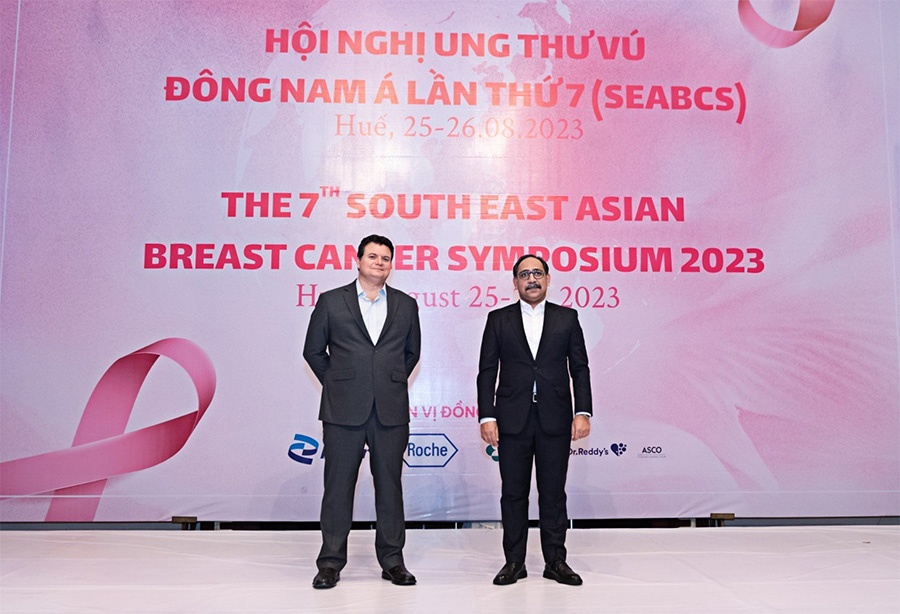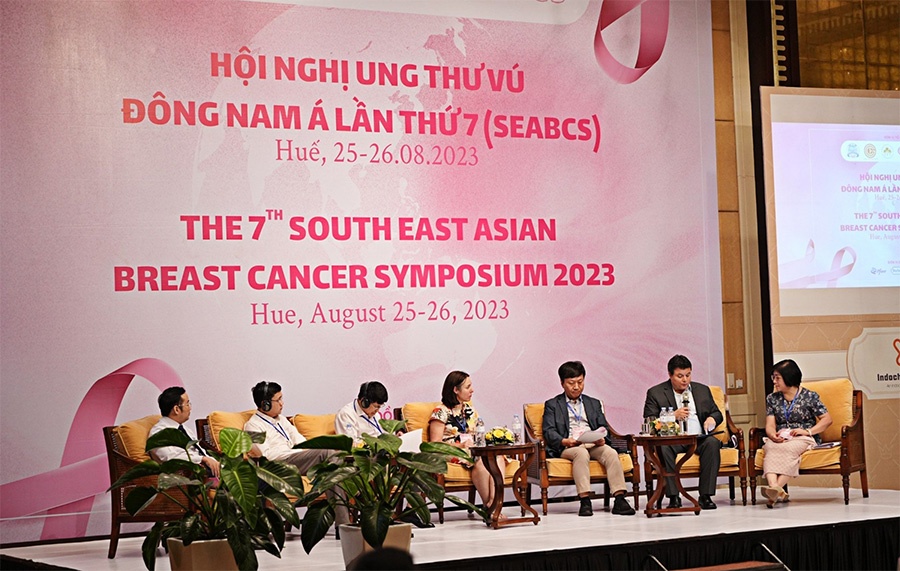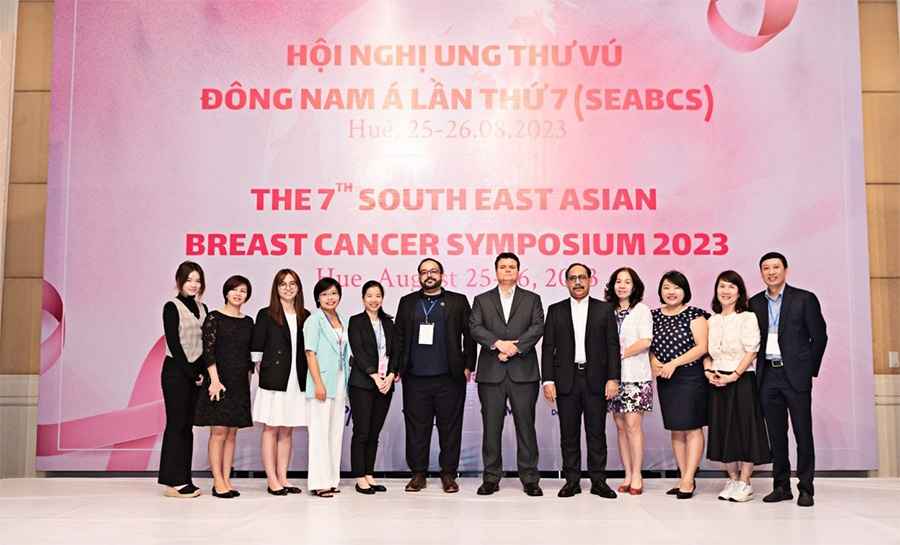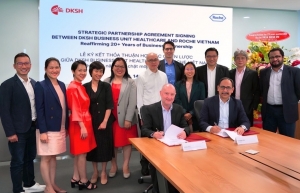Roche commitment to improving women’s cancer care
 |
| Lennor Carrillo, general director of Roche Pharmaceuticals (left) and Qadeer Raza, general manager of Roche Vietnam (Diagnostics)(right) |
What are the main takeaways from the latest report about women's cancer in Asia Pacific?
Dr. Raza: With an aim to accelerate the region’s effort and process towards WHO’s targets for breast cancer and the elimination of cervical cancer, an Economist Impact report entitled “Impact and Opportunity: The Case for Investing in Women’s Cancers in Asia Pacific” was launched at the 7th Southeast Asia Breast Cancer Conference on August 25th in Hue. Commissioned by the Asia-Pacific Women's Cancer Coalition and supported by Roche, the report presented to key stakeholders in the region challenges and crucial steps towards improving outcomes in women's cancer care.
The report delves deep into the burden of women's cancer, specifically breast and cervical cancer, in six countries in the Asia-Pacific region, including India, Indonesia, Malaysia, Philippines, Thailand, and Vietnam. The key messages from the report's findings can be summarized as follows.
First, with concrete data and vital evidence, the report indicates the burden of breast and cervical cancer is on the rise in Asia-Pacific, and this will worsen without concerted action.
Second, there is an urgent need to seize opportunities and act to address the significant challenges in breast and cervical cancer care, especially in policy and planning, prevention and screening, diagnosis and resource capacity, tTreatment and access, awareness and education
Third, countries must prioritize women's health by strengthening political will, establishing robust plans and measures, enhancing screening and prevention efforts, and tailoring approaches to improve equitable access.
It will also be crucial to work together to build capacity and funding as well as raise awareness as part of a comprehensive and patient-centric approach to achieve the WHO’s targets for breast cancer and the elimination of cervical cancer.
 |
Given that investment in women’s health is one of the core themes of the report, how can this investment generate a positive impact?
Carrillo: The first thing I wanted to touch on is a mindset issue that needs to be addressed. We need to stop thinking about health as an expenditure and start recognising it for what it is, an investment.
The numbers are unquestionable. At societal level, WHO has shown that for every VND we invest now in improving women’s health we can get 3.2 back and that is only the direct return, if we look at indirect impact the number can go as high as 26.
Reimbursement for breast and cervical cancer screening is not an expense, it’s an investment, and it has been proven that it can be a cost-saving intervention. We have to work on this mindset shift so that all stakeholders understand this.
Moreover, investing in women’s health isn’t simply investing in individual women, but also their families and their communities, as well as their country’s economy and future. For example, improved health outcomes for women can increase productivity by giving them more opportunities to contribute to their societies. This is especially important in lower income households, as women can support their families to achieve better financial health.
Can you elaborate on Roche’s regional commitment to women’s cancer care and women’s health?
Dr. Raza:As a company with more than 40 years of experience in women’s health, we understand that healthcare isn't a one-size-fits-all solution. Improving health outcomes for women in this region means offering individualised and comprehensive care at every stage of life.
Specifically, we incorporate women’s experiences into the research and development and clinical trial process, from investing in early detection, to prevention and treatment of diseases. We strongly believe our prioritising and investing in a women-centric approach to health and care for women can create a healthier future for women not just in Vietnam, but in Asia Pacific and around the world.
 |
How does Roche perceive the role of public-private partnerships in women's health?
Carrillo: At Roche, our view is that the future of health systems is something in which we all have a shared responsibility. We are proud of our continued partnership with governments, NGOs, and the private sector in putting in place changes that will benefit patients and societies over the longer term, working in public-private partnerships that advocate for health literacy, policy shaping, advancements in digital health, infrastructure development, and better access to care for patients throughout the Asia Pacific region.
What are some highlight partnership projects you have in Vietnam?
Carrillo: In breast cancer, the programme we are best known for is "We care for Her" and then "Joining Hands for Her." Since 2013, Roche has partnered with stakeholders to improve early diagnosis and access to innovative therapies for women in Vietnam. Thanks to this joint-effort, more than 45,000 women were screened for free, 600 healthcare professionals were trained, and more women are being diagnosed with early-stage breast cancer.
Dr. Raza: On the cervical cancer front, Roche has successfully collaborated with various stakeholders and authorities for HPV awareness campaigns over the years. Besides our HPV DNA tests offered to women at healthcare centres, in 2023, we introduced to the market HPV self sampling to aid women’s access and overcome psychological barriers. We work closely with our stakeholders in educational campaigns to help women understand all the available options for their cervix screening.
 | DKSH, Roche extend partnership in Vietnam DKSH Business Unit Healthcare, a market expansion services provider for companies seeking to grow their healthcare business, in June signed an extended agreement with Roche Vietnam to strengthen its business growth. |
 | K Hospital and Roche Pharma Vietnam co-organise cancer immunotherapy seminar K Hospital, together with Roche Pharma Vietnam, have organised a highly anticipated scientific conference themed Cancer ImmunoTherapy - Light to guide the future in the treatment of lung and liver cancer. |
 | Urgent action needed on breast and cervical cancer Newly launched Asia Pacific Women’s Cancer Coalition (APAC WCC) calls for a greater commitment to address the gaps to support countries in achieving their national targets for cancer prevention and control. |
What the stars mean:
★ Poor ★ ★ Promising ★★★ Good ★★★★ Very good ★★★★★ Exceptional
Themes: Healthcare Platform
- PM outlines new tasks for healthcare sector
- Opella and Long Chau join forces to enhance digestive and bone health
- Hanoi intensifies airport monitoring amid Nipah disease risks
- Cosmetics rules set for overhaul under draft decree
- Policy obstacles being addressed in drug licensing and renewal
Related Contents
Latest News
More News
- PM outlines new tasks for healthcare sector (February 25, 2026 | 16:00)
- Myriad risks ahead, but ones Vietnam can confront (February 20, 2026 | 15:02)
- Vietnam making the leap into AI and semiconductors (February 20, 2026 | 09:37)
- Funding must be activated for semiconductor success (February 20, 2026 | 09:20)
- Resilience as new benchmark for smarter infrastructure (February 19, 2026 | 20:35)
- A golden time to shine within ASEAN (February 19, 2026 | 20:22)
- Vietnam’s pivotal year for advancing sustainability (February 19, 2026 | 08:44)
- Strengthening the core role of industry and trade (February 19, 2026 | 08:35)
- Future orientations for healthcare improvements (February 19, 2026 | 08:29)
- Infrastructure orientations suitable for a new chapter (February 19, 2026 | 08:15)

 Tag:
Tag:



















 Mobile Version
Mobile Version